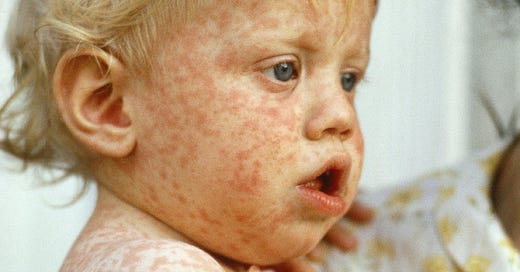File this one under articles I hoped I’d never have to write.
Parents, we need to talk. Measles – the disease you probably thought you’d never ever hear of again – is back. The main reason for this is waning immunization rates, and with antivaxxers and conspiracy theorists controlling the federal government, it’s time to make sure your own family is informed and protected.
So let’s clear up some common myths, tackle some tough topics, and most importantly make sure your little ones don’t become stars on the measles comeback tour.
Myth #1: “Measles isn’t that bad”
Oh, if only this were true. Measles isn’t just a little rash and a few days of fever… It makes chickenpox look like the common cold. Measles is a highly contagious (actually insanely contagious) airborne virus that can cause pneumonia, encephalitis aka brain swelling, and even death.
Before the MMR (Measles, Mumps and Rubella) vaccine, about 1 out of every 5 kids who got measles ended up in the hospital. Compare that to the flu, which has a hospitalization rate closer to 1 in 20. That’s deadly serious.
And if that isn’t enough to convince you that measles isn’t just another common cold, patients who survive measles are at risk for a rare but terrifying complication called SSPE (subacute sclerosing panencephalitis). This is a progressive, fatal, incurable neurologic condition where the brain basically gets incredibly inflamed and then atrophies, years after a measles infection. Yes it’s rare (less than 10 cases per 100,000 patients), but again it is entirely preventable through vaccination!
Myth #2: “Natural immunity is better than the vaccine”
This couldn’t be more wrong, but this statement thrives in an online ecosystem that is driven by partial truths. Sure, no one is denying that if you survive a full-blown measles infection you will have strong immunity… but contrary to the great Kelly Clarkson, not everything that doesn’t kill us makes us stronger.
The risks associated with actually contracting measles are astronomic compared to the risks that come with immunization, which are occasional mild rash, some achy lymph nodes, and a low-grade fever. The vaccine is usually extremely well-tolerated.
Put another way, if we are talking about my own nieces and nephews I would NEVER EVER in a million years recommend they opt for natural infection over the vaccine.
Myth #3: “The MMR vaccine causes autism”
Ever heard the phrase “correlation does not imply causation”? That means, just because two trends line up with each other, it does not mean one caused the other. The classic example is ice cream sales and shark attacks. Over the course of a year, ice cream sales peak in summer and so do shark attacks, but eating ice cream doesn’t cause shark attacks!
So yeah, the idea that any immunization causes autism has been debunked over & over ad nauseum (no really this is making me nauseous). The one – yes ONE – study that suggested there was causation between the MMR vaccine and autism has been retracted and the author had his license revoked for falsifying data. Science is always in flux, so I’m hesitant to call anything settled science… but y’all this is settled science if I’ve ever seen it.
So, is my kid protected?
Check your child’s health records. If your kid received all their routine vaccinations, they are starting off in good shape. The CDC recommends two doses of the MMR vaccine, once around one year old and again around four-to-six years old. These two doses together provide an astounding 97% protection rate against measles, and that is pretty darn cool if you ask me.
Where we get into trouble is when community immunization rates drop below 90%. That’s when we start to see biology and statistics collide, and everyone’s risk rises just due to the sheer capacity of the community to become infected and spread infection. It’s called public health for a reason!
If you are worried about a possible measles exposure, any kid over the age of six months can get a dose of the MMR vaccine, ideally as soon as possible (within 72 hours), to reduce the risk of falling ill.
The takeaways
Measles is dangerous, incredibly infectious, and almost entirely preventable.
The best thing you can do? Vaccinate your kids, stay informed, and don’t let misinformation put your friends or family at risk.
Measles is a preventable disease that we should not have to worry about, and yet here we are. For crying out loud, the MMR vaccine has saved an estimated 94,000,000 lives worldwide, so far. Talk about tried & true!
So check in with your pediatrician or family doctor, and if you or your child aren’t fully vaccinated, you know what to do! You got this.






As a pediatrician old enough to have dealt with measles cases during the early days of vaccine availability, I had a patient die from SSPE. Other long term complications include hearing loss and "immune amnesia", a way that the measles virus causes the immune system to "forget" the immunity it has developed (through immunization or natural exposure) to other viruses and bacteria. Measles vaccine is a life-saver. Please heed Dr. Andrews' advice and make sure your kids are immunized.
Thank you for this helpful and informative read!! Everyone please share. We need to combat the misinformation out there!